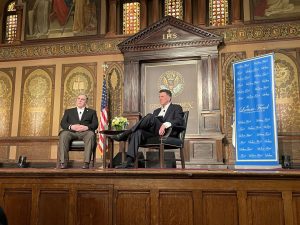Mark Milley, Distinguished Fellow in Residence and former chairman of the Joint Chiefs of Staff, warned of military politicization and global threats to national security in the Georgetown University Lecture Fund’s annual Michael Jurist Lecture April 2.
Surveying various foreign challenges to the United States, Milley emphasized in particular conflicts in the Mideast, Asia and Europe, specifically naming China, Iran, North Korea and Russia as the four biggest threats facing the United States. Addressing domestic issues, Milley turned to the dangers of the military being used as a political entity and the potential for its mobilization ahead of upcoming elections.
Citing continued fighting between Israel and Hamas, Milley said the Middle East posed a challenge for the United States because of its potential to devolve into a larger conflict.
“Overseas, the Middle East is in turmoil, largely as a result of the war going on between Israel and Hamas in the Gaza Strip,” Milley said at the event. “It’s a very significant challenge because U.S. interests are at stake. We, the United States, want to make sure that it doesn’t expand into something bigger and into regional war, and that it gets settled, ideally politically through some sort of negotiated settlement.”

After retiring at the end of his term as chairman of the Joint Chiefs of Staff, which is a council made up of every military branch’s highest leader, in 2023, Milley joined the School of Foreign Service as a Distinguished Fellow in Residence in February 2024.
He said that the Russia-Ukraine War could similarly expand in scope and lead to a wider regional — or even continent-wide — conflict.
“The biggest war since World War II is going on between Russia and Ukraine, and that involves very, very serious U.S. interests. That is one situation involving a potential adversary Russia that has exceptional military capabilities, and we want to make sure that one doesn’t expand into some more violent or more devastating conflict, which could easily expand into a regional conflict or continental-wide conflict, and that would be extraordinarily dangerous,” Milley said.
Despite the absence of a direct military conflict, Milley also warned of rising tensions with China, saying the country’s strong economy and military could lead to confrontation.
“The potential is there and China is the one place where the United States could find itself in a great power conflict in the coming years. And that is possible. It’s not imminent. It’s not inevitable, but it is possible,” Milley said.
“The probability is not zero and you’ve got a rising power in China that is an economic powerhouse, a manufacturing powerhouse. With all that money, they’re building a military, so they are a rising power economically and they are building a world-class military,” he added.
Milley said that the Russia-Ukraine War and the potential for future conflict with China are challenging the international consensus established after World War II.
“We’re in the 80th year of the rules, and that’s the so-called rules-based international order. Those rules that exist have kept great power peace. Those rules are under intense stress. They’re actually fracturing in many ways,” Milley said.
Focusing on the future, Milley told the audience the next two decades will be crucial, though challenging, in avoiding conflict and improving the relationship between the United States and China.
“We don’t understand the Chinese; they don’t understand us. It’s fundamental differences, both in culture, in history, in interests. So it’s going to be really hard to do that but it’s going to be really necessary because a great power war between the United States and China would be devastating. It would be unbelievable,” Milley said.
Discussing military intervention in elections, Milley said he feels military officers must avoid politics and instead remain steadfast to their constitutional duties. He said he failed to follow his own advice in 2020, when he walked with then-President Donald Trump to a photo-op in Washington, D.C. — a move he said he regrets — amid protests against police brutality.
“We as military officers have to know and be apolitical, non-political. We have to be nonpartisan,” Milley said. “Now there are cases and mistakes that are made or things happen. In my case, for example, walking across from the White House to St. John’s Church in the summer of ’20 in the events around Lafayette Square, that was a mistake on my part where it was a very highly charged political event and I definitely shouldn’t have been there.”
“My advice would be remember your oath. That is your North Star. Don’t ever forget it,” Milley added. “Never turn your back on the Constitution and do not turn your guns on the American people.”








